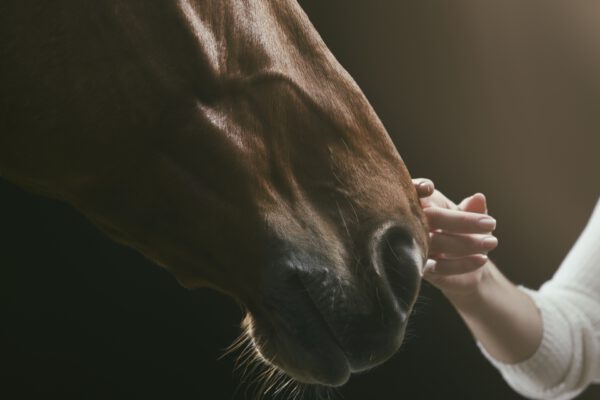How to approach your insurance company as an Equine Osteopath EDO®
Interview: Bernard Ysebaert, Equine Osteopath EDO® and Canine Osteopath CDO®
Bernard Ysebaert, born in Ghent (Belgium), has lived in Luxembourg for over 25 years now and is currently still active in the financial sector. When we spoke with Bernard during the WAEO Conference 2023, held in Waldfeucht at the Vluggen Institute, he told us about his experiences with insurance companies. He explained that by being and using the title ‘Equine Osteopath EDO®’ has helped him in his search for an appropriate insurance.

Bernard spent a lot of time among horses in his teenage years, when ten years ago he decided to take up this passion. When he realized how much impact the rider has on a horse, he became motivated to devote himself to the health and wellbeing of the horse. This conviction brought him to the Vluggen Institute 5 years ago, from which he graduated in 2022. Since then, he has been active as an Equine Osteopath EDO® and since 2023 as a Canine Osteopath CDO® as well.
For him, the year 2022 was mainly about officializing his profession with the Luxembourg authorities.
How did you approach your insurance company?
‘Firstly, I decided to contact my own insurance company. I already had several contracts with them, so I figured it would be a good place to start.
‘I requested a full hour with my insurance agent to discuss the options for a new contract. I started the conversation by giving a full and correct description of what the work of an Equine Osteopath EDO® consists of, what it entails, etc.. I was lucky that osteopathy and manual therapy was not unknown to my insurance agent and that he already insured several local veterinarians. He explained the various options to insure both the professional aspect, like Professional Liability, as well as my own personal protection (illness, accidents or disability) as a therapist.
‘It was clear to my insurance agent that this was about the welfare and health of animals, so he proposed setting up the same professional liability contracts that he used for veterinarians. I was very pleased and satisfied by this service and contract set up and felt they were both appropriate and acceptable to me. If necessary, I would have contacted other insurance companies in a similar way.’
Do you have any tips/advice for other Equine Osteopaths EDO® in preparation for such a conversation?
‘Inform yourself clearly about what steps are required to get local recognition for your status, be it with a ministry or your local authority.
‘Make sure you are well prepared for your meeting, book plenty of time and be clear in what you want to achieve. Have all your documentation ready, so you can provide your insurance agent with all the required information regarding your approval.
‘Don’t make things too complicated and try to stay plain and comprehensible, in case the person doesn’t know anything about osteopathy. Be open in where you stand, whether you are a starting practitioner or have been working for several years already. I was fortunate to be given an advantage as a starting Equine Osteopath EDO®: a 50% discount, until I had established a sufficient clientele.
‘Be clear about what exactly you wish to treat and insure. Do you want to treat horses/dogs that are used in competition, breeding, etc., or do you want to limit yourself to private customers (both are perfectly fine but be clear in your intentions). Think about these matters, for they will have an impact on your contract. The more expensive the horse/dog is, the higher the claim for compensation could be.
‘Read your contract carefully, make a second appointment with your agent if necessary, in case you want to discuss small (or large) uncertainties. Do not sign any contract until all your questions have been answered satisfactorily!
‘Last but not least, make sure the contract fits your budget. Not only your current budget, but your expectations for the future as well. Think about whether things will remain affordable for you, even if something might temporarily keep you from practicing. I, for instance, took on an additional personal insurance for incapacity to work. Be sure to check how quickly/easily those insurances can be cancelled as well!’
Why being a registered Equine Osteopath EDO®/Canine Osteopath CDO® matters when approaching insurance companies
The IREO works on an international level, with registrants from all over the world. This creates unity among colleagues and supports the exchange of knowledge and experiences. In some situations, however, we must take into account each and every country’s own laws and bylaws.
Insurance companies require a standard to which equine osteopaths must adhere to, making it easier to get a clear idea of the profession. They require certainty that someone is competent enough for them to insure. The IREO can offer just such a thing: The Standards for Equine Osteopathy EDO®; a document in which it is clearly and correctly described what the profession means and entails.
Naturally, insurances vary from country to country. What might be easily insured in one country, might not be accepted in another. But where laws and bylaws may vary per country, the Standards for Equine Osteopathy EDO® remain the same everywhere.
Hopefully, Bernard’s experiences might inspire other registered Equine Osteopaths EDO® or Canine Osteopaths CDO® to take similar initiatives.
